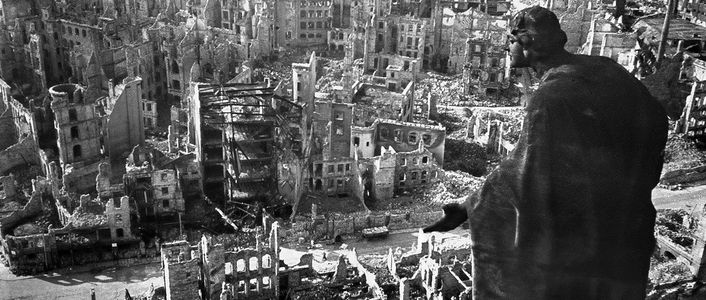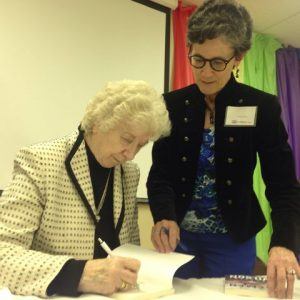German woman shares harrowing WWII journey at Delta Visual Arts Show
by February 28, 2018 7:00 pm 520 views

Edith Harris was about to share a meal with her mother, father, and seven siblings when there was a sudden knock at the door. It was September 1939 and the family lived in Bremen, a town in northern Germany near the North Sea. The father was taken to serve in the military as the Nazis began invasions all over Europe. As a healthy adult male, he was expected to serve. They didn’t know if they would ever see their father again.
Many stories have been written about soldiers, holocaust survivors, and others aspects of the war, author Cecelia Wilson told Talk Business & Politics. Harris, 81, resides in Cabot, and has been friends with Wilson for years. The two decided to collaborate on a book, “Back to Bremen” chronicling her experiences. The two spoke at the Delta Visual Arts Show on Saturday in Newport.
“Bombs rained from the sky. We had bombings everyday,” Harris recalled. “We had to sleep with our clothes on so we could run to the bunkers. We couldn’t play outside. Our entire lives were completely disrupted.”
Dead bodies, destroyed buildings, hunger, fear, the cold, and many others dominated Harris’ young life, she said. The family was Christian, and children at school ostracized them for their religion.
“It was awful … they treated us badly,” she said.
German armies rolled across Europe during the early years of the war, and Bremen wasn’t bombed that much, she said. By 1942, the tide of the war began to swing, and life changed, Harris said. Food was rationed. The bombings increased, and her older brother was drafted. She described how her family’s home was bombed three times, and the last time it was blown to pieces, while dead bodies littered the streets.
The family was forced to move to a small village just outside of Dresden. They lived in a manor with a Nazi officer who she said forced them to salute each time they saw him. There’s one moment emblazoned in her memory. On Feb. 13, 1945, British and American bombers attacked Dresden. The city received heavy damage from the blitz. Harris, then 9, watched all night from the safety of a balcony in the village.
“The sky was lit up like Christmas trees … you will never forget that,” she said.
For the next several weeks, the children had to stay indoors. Animals at the nearby Dresden Zoo escaped during the bombings. School was no longer held, and food was hard to come by, she said. The family had no idea about the atrocities committed by the Nazis. It was years later before she knew about the Holocaust.
Allied forces entered Germany from the west and the Soviet army invaded the country from the east near the time of the Dresden bombings. Harris’ mother was told the family needed to leave. The mother and seven siblings began a nearly 10-week walk back to Bremen. The family slept on the ground in the woods bundled together in the dark. They stole or begged for food, Harris said. Once, she and her brother woke to the smell of baking bread.
“We ran and stole the bread … mother was not happy, but we were so hungry,” she said.
Soviet soldiers captured the family and took them to a prison camp. The family stayed in the camp for about two weeks and then escaped with the help of some German soldiers, she said.
The walk continued. The family eventually reached Bremen. There were no houses to live in, so the family had to live in bombed out buildings, train stations, and eventually a barracks. The war ended and food was rationed by the government. She said her family didn’t know if her father and brother had survived the war. A few years went by.
In 1947, the family went to get their meager rations when they noticed a raggedy clothed former soldier. It was Harris’ father. They didn’t recognize him.

“We had tears in our eyes. We didn’t know it was him,” she said. “He was never the same after the war.”
The family got another pleasant surprise in 1948 when Harris’ brother returned. He’d been working in a Belgian coal mine.
Harris met an American soldier from Texas named Henry “Hank” Harris in 1957. The two married, and she lived all over the world during his military career. They had three girls. When he retired, the couple moved to Cabot.
Wilson became friends with Harris and wrote about her experiences during the war. A few years ago she decided it was time to write a book.
“Her stories are so good … it’s almost like a movie script, only it really happened,” Wilson said.
